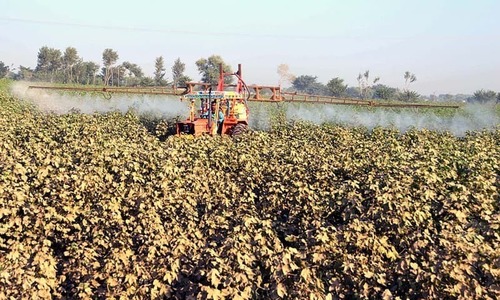ISLAMABAD:World Wildlife Fund (WWF) Pakistan, in collaboration with the Laudes Foundation, unveiled the ‘Regenerative Production Landscape Collaborative Pakistan’ initiative on Thursday, aimed at revolutionising farming practices and business models to tackle challenges faced by smallholder farmers, with a special focus on women as well.
Over a span of five years, the initiative seeks to elevate women’s income generation capabilities through sustainable practices. Additionally, it aims to combat environmental degradation.
The initiative, backed by textile and food brands, would initially focus on the Jhang and Sahiwal districts of Punjab, as well as the Barkhan and Lasbela districts of Balochistan. Drawing inspiration from successful models implemented in India, Brazil, and Tanzania, the RPLC Pakistan endeavours to bring about holistic changes in agricultural landscapes.
Speaking at the launch event, Hammad Naqi Khan, Director General of WWF-Pakistan, highlighted the pressing need to address unsustainable agricultural practices in Pakistan.
He emphasised the detrimental impact of excessive water usage, chemical fertilisers, and pesticides on crop and soil productivity, exacerbated by climate change.
Hammad Khan stressed that the initiative aimed to foster collaboration and innovation to enhance climate resilience and agricultural yields among local farmers.
Anita Chester, Head of the Fashion Programme at Laudes Foundation, expressed enthusiasm for the RPLC’s launch in Pakistan, affirming the foundation’s confidence in WWF-Pakistan. Anita Chester underscored the initiative’s goal of fostering sustainable and regenerative practices, supporting local farmers and communities, and promoting responsible sourcing practices among businesses. She noted the initiative’s significant scale, spanning over a million hectares globally and benefiting hundreds of thousands of farmers, with specific plans to cover over 100,000 hectares and assist more than 50,000 farmers in Pakistan alone.
Ghulam Mohammad Ali, Chairman of the Pakistan Agricultural Research Council (PARC), commended the project for its potential to enhance crop productivity and income generation for smallholder farmers while reducing reliance on harmful fertilisers and pesticides.
He emphasised the importance of nature-based solutions to mitigate climate change impacts and promote sustainable farming practices, expressing appreciation for the collaborative efforts of all stakeholders involved.
The initiative comes at a critical time for Pakistan, grappling with the devastating effects of climate change, as evidenced by recent floods and rains that claimed over 1,700 lives in 2022. Qadir Baksh Pirkani, special secretary agriculture for the government of Balochistan, highlighted the province’s immense agricultural potential despite challenges such as water scarcity and limited market access.
He stressed the need for investments in agriculture and capacity-building efforts to empower vulnerable farmers and mitigate climate-related risks.
Asad Imran, Director of Foods and Markets at WWF-Pakistan, outlined the project’s objectives, emphasising its focus on landscape-based approaches to combat land degradation and improve water resource management.
Published in Dawn, May 3rd, 2024












































Dear visitor, the comments section is undergoing an overhaul and will return soon.